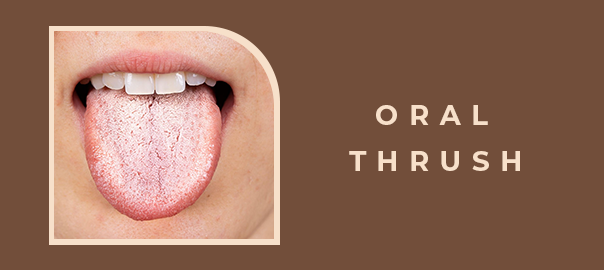
Oral Thrush – Symptoms, Causes, Treatment
Oral thrush aka Oropharyngeal Candidiasis, is a common fungal infection affecting the mouth and throat. It is caused by the overgrowth of Candida albicans which is a yeast present in the human body. While Candida is typically harmless, certain factors can lead to its overgrowth, resulting in the development of oral thrush. This blog post will delve into the symptoms, causes, and treatment options for this condition.
Symptoms of Oral Thrush
- 1. White Lesions: The most prominent symptom of oral thrush is the presence of creamy and white lesions. These can be present on the tongue, inner cheeks, and other areas of the mouth and throat.
- 2. Redness and Soreness: The affected areas may appear red and feel sore, causing discomfort and difficulty swallowing.
- 3. Dry Mouth: Some individuals may experience a cottony or dry sensation in the mouth.
- 4. Loss of Taste: Oral thrush can lead to a diminished sense of taste.
Causes of Oral Thrush
- 1. Weak Immune System: Individuals with weakened immune systems, such as HIV/AIDS, cancer, or diabetes, are more susceptible to oral thrush.
- 2. Antibiotic Use: Continous use of antibiotics can disrupt the balance of microorganisms in the mouth which allows Candida to flourish.
- 3. Steroid Medications: Long-term use of steroid medications can make the immune system weak and increase the risk of oral thrush.
- 4. Diabetes: Poorly controlled diabetes can create an environment conducive to fungal overgrowth.
- 5. Dentures: Ill-fitting dentures or poor oral hygiene can contribute to the development of oral thrush.
Treatment of Oral Thrush
- 1. Antifungal Medications: Topical antifungal medications, such as nystatin or fluconazole, are commonly prescribed to eliminate Candida overgrowth.
- 2. Oral Hygiene: Maintaining good oral health is crucial in preventing and treating oral thrush. Regular brushing, flossing, and tongue cleaning can help reduce the risk of infection.
- 3. Managing Underlying Conditions: Treating underlying medical conditions, such as diabetes or immune system disorders, is essential for preventing recurrent episodes of oral thrush.
- 4. Probiotics: Introducing probiotics into the diet or as supplements can help restore the balance of microorganisms in the mouth, reducing the likelihood of fungal overgrowth.
- 5. Avoiding Irritants: Individuals with oral thrush should avoid tobacco, alcohol, and spicy or acidic foods, as these can exacerbate symptoms.
Conclusion:
Oral thrush is a common and treatable condition affecting individuals of all ages. Recognizing the symptoms, finding out the underlying causes, and seeking prompt medical attention are crucial steps in managing and preventing this fungal infection. If you suspect you have oral thrush or are experiencing persistent symptoms, consult with a dentist for an accurate diagnosis and appropriate treatment. You can contact the nearest Clove Dental clinic by searching for “Clove dental clinic near me” or visiting our website at https://clovedental.in/
DISCLAIMER:Please note that the prices mentioned on this page: (a) present a range (depending upon the severity of the dental condition, the technology used in treatment, type of dental products used, etc.); (b) are true as on the date of this page and may change on a later date, in accordance with the standard company policy; (c) may be subject to standard aberrations or generalizations on account of the use of AI in general Google/internet search by you.Leave a Reply
Leave a Reply
Explore More Similar Posts
Explore More Blogs


Leave a Reply